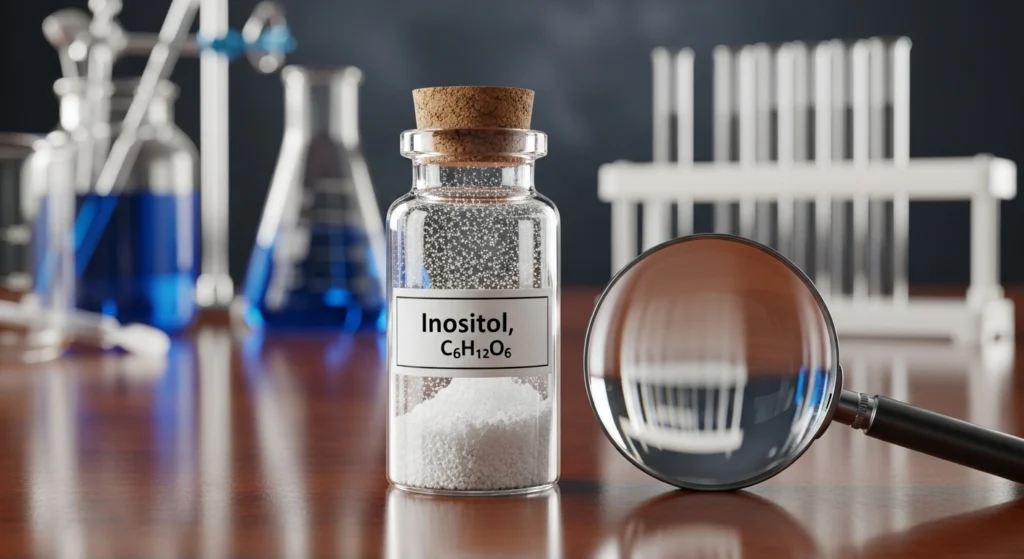Summary
Does Inositol Cause Hair Loss? Inositol is often associated with promoting hormonal balance and supporting hair growth, especially in individuals with conditions like PCOS.
While there is no direct evidence that inositol causes hair loss, some individuals may experience side effects that could affect hair health. This article explores the benefits and potential risks of inositol for hair health, providing insights into how it may support or impact your hair.
Introduction
Inositol is a naturally occurring substance often associated with various health benefits, but does it play a role in hair loss? If you’re wondering whether inositol could be the cause of thinning or shedding hair, you’re not alone.
This article explores inositol’s effects on hair health, shedding light on both potential benefits and side effects. By the end, you’ll understand whether inositol is a friend or foe for your hair.
What is Inositol and How Does It Affect the Body?

What is Inositol?
Inositol is a type of sugar alcohol found in food sources like fruits, beans, grains, and nuts. It plays a vital role in cellular processes, helping to regulate insulin, brain function, and fat metabolism. There are different forms of inositol, with myo-inositol and D-chiro-inositol being the most studied. This substance has gained attention for its potential to support hormonal balance, especially in conditions like PCOS (Polycystic Ovary Syndrome).
The Role of Inositol in Hair Growth
Inositol is often linked to promoting hair health due to its role in maintaining hormonal balance. Since hormones like insulin and testosterone can influence hair follicles, inositol may indirectly support hair growth. It has also been associated with improving scalp health, which is essential for optimal hair follicle function. However, research on its direct effects on hair growth is still evolving.
Can Inositol Cause Hair Loss?
Evidence Supporting Inositol’s Impact on Hair
Inositol has a reputation for being beneficial in promoting healthy hair. There is no conclusive evidence to suggest that inositol causes hair loss directly. However, some individuals may experience changes in their hair due to shifts in their hormone levels or metabolic processes. For instance, studies suggest that inositol’s ability to regulate insulin and improve hormonal balance could lead to better hair growth in individuals with PCOS, where hormonal imbalance often results in hair thinning.
Potential Side Effects of Inositol
Although inositol is generally considered safe, it can cause side effects in some individuals. These side effects may indirectly affect hair health. For example, weight fluctuations, digestive issues, or changes in hormone levels due to inositol use may contribute to hair thinning. Additionally, as inositol influences insulin sensitivity, those with diabetes or metabolic disorders should monitor their condition while using it. It’s always essential to speak with a healthcare provider before starting supplementation, particularly if you’re concerned about hair health.
How Inositol Can Promote Hair Growth (Benefits)
Inositol and PCOS
Inositol, especially myo-inositol, is a well-known supplement for women with PCOS. It helps to restore hormonal balance, reducing the effects of elevated androgen levels, which can lead to hair thinning. Many women with PCOS who use inositol report healthier hair and less shedding. Studies have shown that inositol supplementation may even improve ovulatory function, contributing to better hair growth over time.
Inositol’s Role in Hormonal Regulation
Inositol’s ability to regulate insulin levels and improve hormonal balance plays a key role in hair health. High insulin levels are often linked to excessive androgen production, which can lead to hair loss, particularly in women. By balancing these hormones, inositol may help prevent hair loss triggered by hormonal imbalances. This is particularly beneficial for those struggling with conditions like PCOS or insulin resistance.
When Should You Avoid Inositol for Hair Loss?
Warning Signs to Look For
Although inositol is typically safe, there are some cases where it may not be suitable. If you notice significant hair loss or scalp issues after starting inositol, it might be a sign that the supplement is not agreeing with you. Other signs that you should reconsider its use include rapid weight changes or worsening of metabolic conditions. If you’re unsure, it’s always best to consult with a healthcare professional to ensure it’s the right choice for you.
Interactions with Other Medications
Inositol can interact with certain medications, particularly those used to treat diabetes and hormonal imbalances. If you’re taking medication for conditions like insulin resistance or PCOS, discuss with your doctor whether inositol is a safe supplement for you. The interplay between inositol and other treatments could potentially lead to side effects that may affect hair growth.

Frequently Asked Questions (FAQs)
Can Inositol Help Prevent Hair Loss?
Is Inositol Safe for Everyone to Use?
What is the Ideal Dosage of Inositol for Hair Health?
Next Steps
Inositol is generally a safe and beneficial supplement for hair health, particularly for individuals with conditions like PCOS. While it doesn’t directly cause hair loss, any supplement can have varying effects depending on the individual.
If you’re concerned about hair thinning or scalp health, consulting a healthcare provider is crucial to ensure that inositol is the right choice for you.
Book a consultation with Dr. Rana Irfan today to explore personalized treatments for your hair health and hormonal balance.
